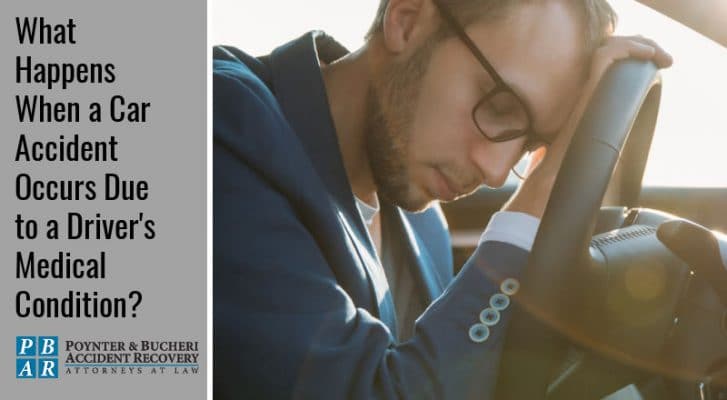
What Happens When a Car Accident Occurs Due to a Driver’s Medical Condition?

What you’ll learn reading this article:
- Indiana has certain restrictions in place for known medical conditions that may affect a driver’s ability to safely operate a vehicle.
- When an unforeseen medical emergency occurs, a driver may not be found liable if they meet the standards for the sudden emergency doctrine.
- Cases dealing with medical emergencies can be particularly tricky, and hiring a lawyer can be the best way to ensure the outcome you deserve.
In a standard car accident caused by negligence or a distracted driver, liability is often fairly clear cut. However, if an accident occurs because a driver suffers a medical emergency, things can become trickier. In these cases, evidence of what transpired in the at-fault driver’s vehicle becomes especially important as does the driver’s medical history.
What Types of Known Medical Conditions Might a Driver Face?
Certain medical conditions can affect a person’s ability to drive safely. Conditions related to vision, hearing, muscle function and control, and brain function are especially relevant when it comes to performing the tasks required to drive.
Drivers who suffer from conditions known to cause seizures or fainting spells, who require specialty adaptive equipment, or who suffer from vision loss must pass certain tests and requirements in order to maintain a license.
In Indiana, when you take your driving test and get your license, you are required to report any known medical conditions that affect your driving ability. These are often then printed on your license as restrictions. In Indiana, restrictions dealing with physical and medical conditions are:
- Restriction B, which requires the driver to wear contacts or glasses.
- Restriction C, which requires the driver to make use of adaptive equipment to drive, such as special brakes, a steering knob and more.
- Restriction D, which denotes a driver who has a prosthetic.
- Restriction F, which requires the driver to use an outside rearview mirror due to results of their vision test.
- Restriction G, which requires the driver to only operate a vehicle during daytime hours due to the results of their vision test.
- Restriction J, which covers other additional requirements, such as biennial or annual vision testing, compliance with medicine, an accompanying driver and more.
- Restriction 8, which denotes a driver who has a medical condition that could cause seizures or fainting and is currently on medication for the condition. For this restriction, the driving applicant must bring with them a signed physician’s certificate of medical impairment and the restriction must remain on their license until a signed physician’s form details the condition is no longer present.
Each of these restrictions deals with known medical conditions. The problem, however, lies in the driver facing an unforeseen medical condition while driving, causing an emergency.
When Unforeseen Medical Conditions Strike
While rare, medical emergencies can and do happen, and if they happen while a person is driving a vehicle, an accident is likely. The types of unforeseen medical conditions that can be especially hazardous to drivers include:
- Seizures.
- Fainting.
- Loss of muscle control.
Each of these examples incapacitates the driver, and while most individuals who suffer from medical conditions that cause these are aware of their status, there are possibilities of an illness going undiagnosed or even of medical malpractice. The driver themselves, however, must not have ignored medical advice or symptoms.
In the case of medical malpractice, a physician or medical professional could prescribe medicine without providing proper instructions to the individual on side effects or failing to prohibit them from driving. Another example would be a misdiagnosis or failure to diagnose a condition even when the driver has presented symptoms that would lead a reasonable doctor to diagnose them.
When situations such as these occur and a driver causes an accident due to an unforeseen medical emergency, there are laws in place to help determine whether they are liable, known in Indiana as the sudden emergency doctrine. A driver ignoring their own symptoms or failing to take proper medication for a known condition, however, does not qualify.
What Is the Sudden Emergency Doctrine?
In Indiana, one must establish three conditions for the doctrine to apply:
- The accident was not caused by nor contributed to by the defendant.
- The danger was immediate and left the defendant no time to consider options for action.
- It was reasonable for the defendant to be apprehensive of the danger.
If these conditions are met, then in a trial the jury will be instructed to consider the sudden emergency doctrine.
Other Unforeseen Emergencies
While rare, it is also possible that a passenger in a vehicle may cause an accident by purposefully distracting or obstructing the driver’s ability to drive safely. Examples would be an unstable passenger grabbing the wheel or perhaps physically assaulting the driver. To find out more about these types of cases as well as what your rights are as an injured passenger in a vehicle, visit our blog post on the subject.
If you or a loved one has had a sudden, unforeseen medical emergency while driving that led to an accident, do not hesitate to contact a lawyer. It is essential in these cases to procure legal representation.
Poynter & Bucheri Accident Recovery—Indianapolis Personal Injury Attorneys
If you or a loved one has been injured physically or mentally by a person, product or company, you need to know your legal rights. Our personal injury attorneys are experienced with cases like yours and can evaluate what your case may be worth. We will ensure that you are protected and compensated for your injuries and losses.
Why pay up to 40% in attorney fees? Our fee is only 25%*, and we fight to win your case or you pay no attorney fees at all. Don’t hesitate—one of our experienced attorneys can assist you right away.
Call (800) 265-9881 for a free case review.
